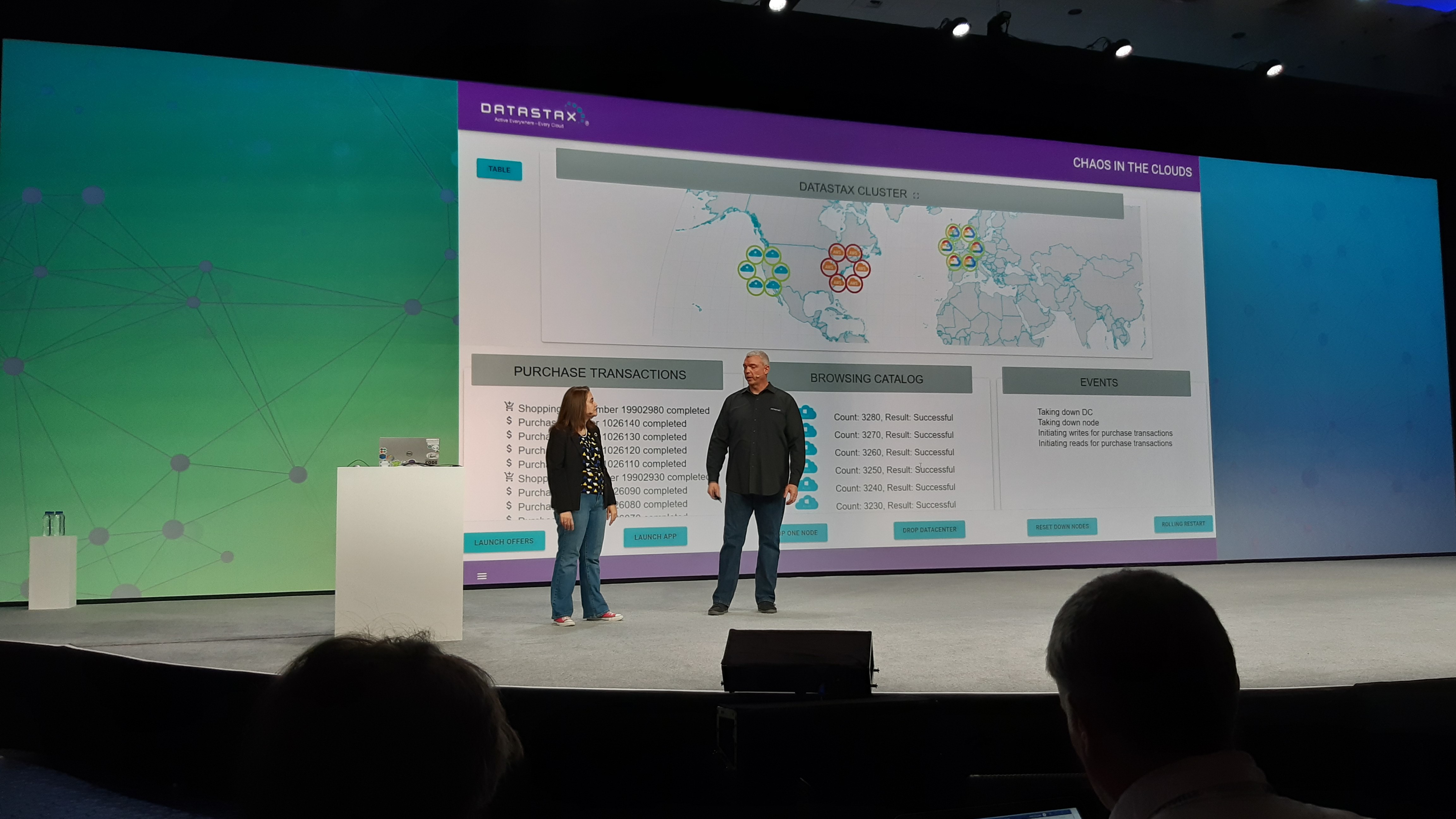DataStax soft launches Constellation for managing cloud deployments
Constellation will launch first on Google Cloud Platform and then on AWS and Microsoft Azure

Like two performers working in tandem, DataStax’s Vanguard Lead, Presales Architecture Chelsea Navo wowed the audience as she spun up three data centers across the world before deliberately knocking one offline live on stage during the opening keynote.
As the stream of transactions from the multi-cloud application continued uninterrupted, the audience gasped in disbelief, and that’s when CEO Billy Bosworth swooped in to make his pitch: “We want to bring this power, performance, and resiliency to everybody.” And the audience at the company's annual conference, DataStax Accelerate, was hooked.
Over the next couple of days all that anyone wanted to talk about was DataStax Constellation -- one of the many services that the company will roll out as part of its DataStax Cloud Platform strategy. The services -- and three were announced during course of the conference -- will begin rolling out later in the year.
- Keeping your head in the cloud, but your feet on the ground
- Why centralized "Know Your Customer" database will never be viable
- A recipe for avoiding disaster in the cloud
Playing to the gallery
The first is dubbed DataStax Apache Cassandra as a Service and is the conferences’ buzzword compliant announcement. The database-as-a-service (DBaaS) product aims to simplify app deployment and development provisioning by reducing the process to just a few clicks. To make it more enticing, DataStax has rolled it along with enterprise grade security and other features and offers it on usage-based pricing terms.

At first glance Constellation sounds like marketing speak for a frontend that eases the process of manually deploying Cassandra in the cloud. Say that to Robin Schumacher, Chief Product Officer at DataStax and he will put you straight in no time:
“Constellation is the overall platform and within Constellation you are going to have a variety of different services that support cloud applications. So it’s kind of like Azure; as Azure is to Microsoft, Constellation is to us. Under Azure you have a variety of different services that developers and database pros take advantage of. It’s the same thing with us; our Cassandra as a Service isn’t just a frontend. It is our actual product, our distribution of Cassandra that has been buttressed with a variety of enterprise components that ready the Open Source Cassandra project for production environment and in particular cloud deployments. So it’s actually our distribution of Cassandra running there with all of the wonderful simplicity and everything of the web console that allows you to point and click your way through to deployments and once you’ve done that you have all the underlying power of the actual database itself at your disposal.”
Constellation was first unveiled at the bootcamp before the start of the conference to a capacity audience who used it throughout the day. Some of the DBAs we spoke to wondered how Constellation compared to InstaClustr, which offers a similar platform for managing Apache Cassandra deployments.
Are you a pro? Subscribe to our newsletter
Sign up to the TechRadar Pro newsletter to get all the top news, opinion, features and guidance your business needs to succeed!
“They kind of do the same thing, in a sense yes,” agrees Schumacher. But quickly adds that InstaClustr takes the Open Source Cassandra and provides a web console for managing it: “When you look at what they do verses what our distribution offers, we have quite a bit more enterprise capability.”
One set of features he points out that are missing in InstaClustr are the advanced security capabilities because it’s based off Open Source Cassandra’s minimalist feature set: “So for people who have critical needs to protect sensitive data, they want to make sure they are able to track who changed what when, who looked at what when; when they need to interface with all the security packages that are out there that their app might need to adhere to; security standards and things along those lines, they are going to find that in our service.”

Right down the middle
Asked how Constellation fits in with the other DataStax products, Schumacher tabs through a series of open presentations in his laptop and brings up a slide in the fourth one. Their entry-level product that’s based on top of the open source Cassandra is the DataStax Distribution of Apache Cassandra (referred to by DataStax as D-DAC). It goes through the company’s production certification, and gets their proprietary bulk loader tool that Schumacher claims loads data about four times faster than other open source utilities.
DataStax Apache Cassandra as a service builds on top of D-DAC and will also have the company’s total advanced performance package, which the company claims will make it two-three times faster than open source Cassandra out of the box. In addition to the security package he mentioned earlier, Schumacher explains that it’ll also get their self-healing features that are going to make sure users don’t have to deal with certain administrative functions that are just a headache to deal with in open source Cassandra.
So is it just DataStax Enterprise (DSE) in the cloud?
“You’re right there are some things we’ve ported over from DSE to the new service but there are things that are just simply not required in the cloud that you may need on-premise. As an example we have something called DSE multi-instance and this allows you to take a particular large piece of hardware and run multiple copies of our software at the same time being able to exploit that larger hardware. But you don’t need that in the cloud because it’s already containerised and is already containing the virtual machines and everything else. So there’s no reason to take all that and put it over to our service. Same is true of some of the other features that we have there.”
Existing Cassandra users, who’ve deployed the database both in its open source avataar and the DSE corporate dressing, are quite excited with Constellation. That’s because Cassandra isn’t the most easiest of solutions to roll out and manage -- and that’s something even the company doesn’t shy away from pointing out, especially now since it’s no longer an issue with the announcement of Constellation. It isn’t the nature of Silicon Valley startups to announce software and services that are still under development, which makes this soft launch even more interesting.
Judging by the positive reaction of the conference attendees, it seems to be the right move for the nine year old startup that’s rumoured to be gearing up to go public sometime soon at a valuation of over a billion dollars.
- We've also highlighted the best cloud databases
With almost two decades of writing and reporting on Linux, Mayank Sharma would like everyone to think he’s TechRadar Pro’s expert on the topic. Of course, he’s just as interested in other computing topics, particularly cybersecurity, cloud, containers, and coding.
